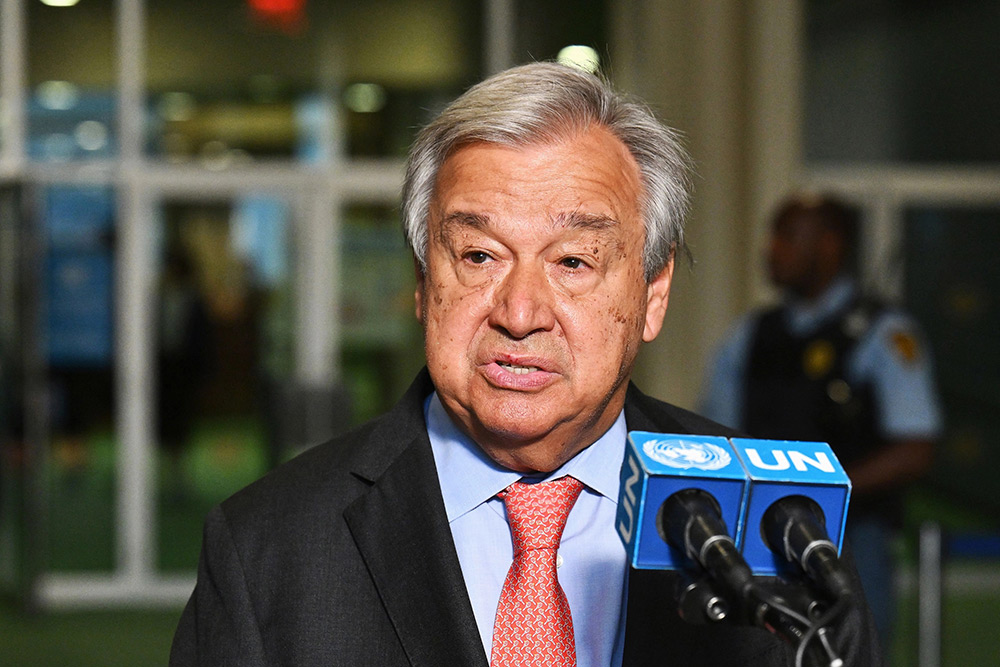
上周,在美国联邦政府表示美国经济连续第二个季度出现萎缩,此后关于经济衰退的讨论达到了白热化的程度。周一,联合国发出了比任何与经济有关的骚动都更可怕的警告:世界正处于核灾难的危险之中。
联合国秘书长安东尼奥·古特雷斯在关于维护1970年生效的《不扩散核武器条约》(Treaty on the Non-Proliferation of Nuclear Weapons)的会议上说:“今天,人类离核毁灭仅一个误解、一个误判之遥。”
古特雷斯在讲话中特别提到了俄乌冲突,并补充说,目前的核战争威胁笼罩在几个同时发生的危机之上,包括“气候危机、严重的不平等、冲突和侵犯人权,以及新冠肺炎疫情造成的个人和经济破坏”。
他说,这些危机使世界处于“冷战高峰以来从未见过的核危险时期”。古特雷斯说,在接下来的几天里,他将访问广岛,以纪念历史上第一次核轰炸。
古特雷斯在讲话中还提到了五个“行动领域”。他说,首先,国际政府需要重申已有77年历史的“反对使用核武器准则”,并提到第二次世界大战的终结。第二个行动领域是消除核武器。
他还概述了解决中东和亚洲地缘政治紧张局势、促进核技术作为一种可持续能源的必要性,以及整体而言,继续维护该条约的必要性。
在提到亚洲的紧张局势时,古特雷斯可能至少部分指的是众议院议长南希·佩洛西(Nancy Pelosi)预计本周将访问台湾。这一计划立即遭到中国的反对,中方敦促美国证实此行不会产生任何政策影响。
然而,中国采取的防御立场仍然令人担忧。“这确实增加了误判的风险,可能导致意想不到的后果。”白宫发言人在新闻发布会上表示,这与古特雷斯当天早些时候的言论相呼应。
“冷战结束后散开的乌云再次聚集。”古特雷斯说。(财富中文网)
译者:中慧言-王芳
上周,在美国联邦政府表示美国经济连续第二个季度出现萎缩,此后关于经济衰退的讨论达到了白热化的程度。周一,联合国发出了比任何与经济有关的骚动都更可怕的警告:世界正处于核灾难的危险之中。
联合国秘书长安东尼奥·古特雷斯在关于维护1970年生效的《不扩散核武器条约》(Treaty on the Non-Proliferation of Nuclear Weapons)的会议上说:“今天,人类离核毁灭仅一个误解、一个误判之遥。”
古特雷斯在讲话中特别提到了俄乌冲突,并补充说,目前的核战争威胁笼罩在几个同时发生的危机之上,包括“气候危机、严重的不平等、冲突和侵犯人权,以及新冠肺炎疫情造成的个人和经济破坏”。
他说,这些危机使世界处于“冷战高峰以来从未见过的核危险时期”。古特雷斯说,在接下来的几天里,他将访问广岛,以纪念历史上第一次核轰炸。
古特雷斯在讲话中还提到了五个“行动领域”。他说,首先,国际政府需要重申已有77年历史的“反对使用核武器准则”,并提到第二次世界大战的终结。第二个行动领域是消除核武器。
他还概述了解决中东和亚洲地缘政治紧张局势、促进核技术作为一种可持续能源的必要性,以及整体而言,继续维护该条约的必要性。
在提到亚洲的紧张局势时,古特雷斯可能至少部分指的是众议院议长南希·佩洛西(Nancy Pelosi)预计本周将访问台湾。这一计划立即遭到中国的反对,中方敦促美国证实此行不会产生任何政策影响。
然而,中国采取的防御立场仍然令人担忧。“这确实增加了误判的风险,可能导致意想不到的后果。”白宫发言人在新闻发布会上表示,这与古特雷斯当天早些时候的言论相呼应。
“冷战结束后散开的乌云再次聚集。”古特雷斯说。(财富中文网)
译者:中慧言-王芳
Recession talk reached a fever pitch last week after the federal government said the U.S. economy shrank for a second consecutive quarter. On Monday, the United Nations issued a far more dire warning than any economy-related commotion could ever match: The world is in danger of nuclear disaster.
“Today, humanity is just one misunderstanding, one miscalculation away from nuclear annihilation,” said Antonio Guterres, the secretary general of the U.N., at a conference about upholding the Treaty on the Non-Proliferation of Nuclear Weapons, which went into effect in 1970.
Guterres specifically cited Russia’s invasion of Ukraine in his remarks, adding that the current threat of nuclear war hovers above several simultaneous crises, including “the climate crisis, stark inequalities, conflicts, and human rights violations, and the personal and economic devastation caused by the COVID-19 pandemic.”
These crises, he said, are placing the world under stress “at a time of nuclear danger not seen since the height of the Cold War.” In the coming days, Guterres said he will be visiting Hiroshima to commemorate the first nuclear bombardment in history.
Guterres also cited five “action areas” in his remarks. First, he said, international governments need to reaffirm the “77-year-old norm” against the use of nuclear weapons, referencing the end of World War II. The second action area is the specific elimination of nuclear weapons.
He also outlined the need to address geopolitical tensions in the Middle East and Asia, promote nuclear technology as a sustainable energy source, and the overall need to continue maintaining the treaty.
In referencing tensions in Asia, Guterres was likely referring, at least in part, to House Speaker Nancy Pelosi’s expected visit to Taiwan this week. The plan sparked immediate pushback from China and prompted the U.S. to confirm that the trip would have no policy implications.
China’s defensive stance, however, remains a cause for concern. “It does increase the risk of miscalculation, which could lead to unintended consequences,” a White House spokesperson said at a press briefing, echoing Guterres’s words from earlier in the day.
“The clouds that parted following the end of the Cold War are gathering once more,” said Guterres.






